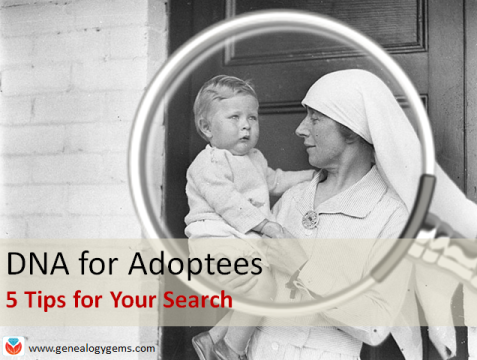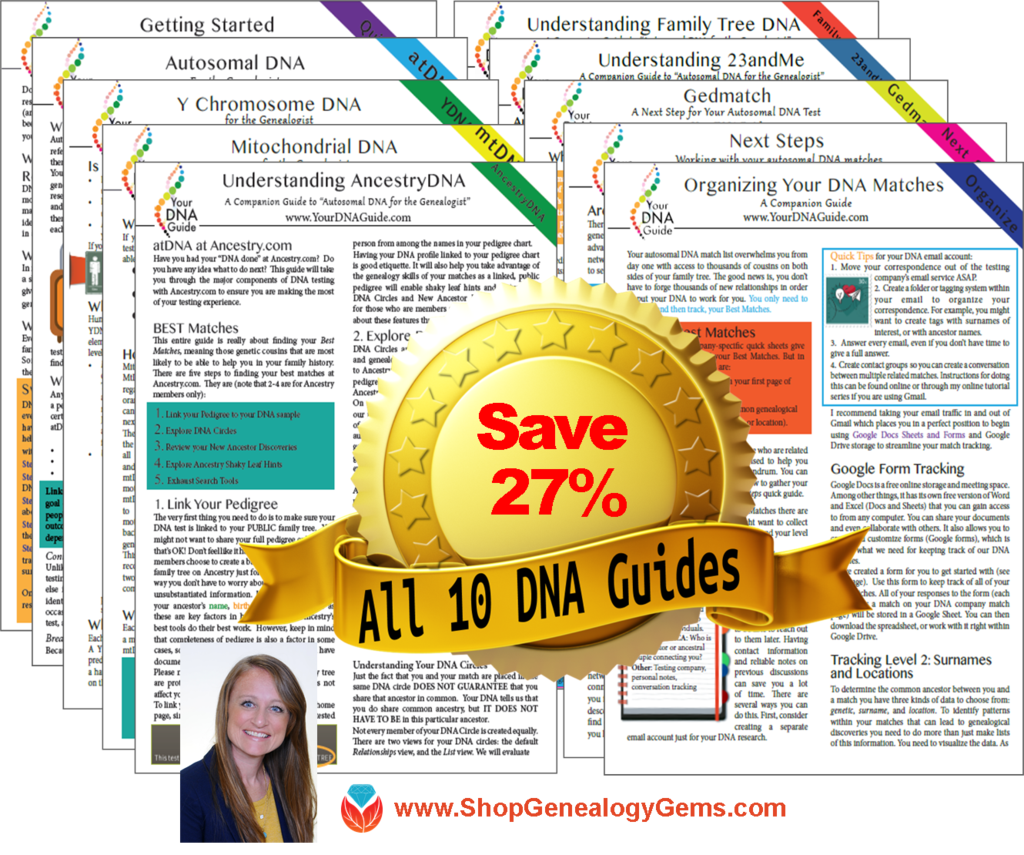DNA testing for adoptees (and others with unknown parentage) isn’t a last resort–use it along with other strategies to discover biological roots. Genetic genealogists CeCe Moore and Diahan Southard share five tips for getting started.

Not long ago, I chatted with genetic genealogist CeCe Moore of The DNA Detectives about using DNA testing for adoptees. Here I summarize some tips she shared, along with some perspectives of my own and resources that can help your search for biological relatives.
Click here to listen to our chat:
DNA testing for adoptees: 5 tips
1. Start with available records. A lot of people of people are coming straight to DNA testing now without looking at any available records first. Adoptees should start by looking at state laws and seeing if they can get access to original birth certificates. Click here to read about access to adoption records (U.S.).
 2. Take an autosomal DNA test. This test looks at both sides of a person’s biological family, mom and dad. Most people start by testing at AncestryDNA because it has the largest database of potential matches (over 4 million now!). If you don’t find a close match (at least a second cousin), you will want to transfer to both Family Tree DNA and MyHeritage for FREE to expand your search radius. Males with unknown paternity should also take a YDNA test (at least at the 37-marker level) from Family Tree DNA.
2. Take an autosomal DNA test. This test looks at both sides of a person’s biological family, mom and dad. Most people start by testing at AncestryDNA because it has the largest database of potential matches (over 4 million now!). If you don’t find a close match (at least a second cousin), you will want to transfer to both Family Tree DNA and MyHeritage for FREE to expand your search radius. Males with unknown paternity should also take a YDNA test (at least at the 37-marker level) from Family Tree DNA.
3. Do your own adoption search. Sure, you can hire someone to help. But you should be invested in your own search when possible. You’ll likely get a much greater satisfaction out of it.
As with any kind of search you are doing for people who may still be living, proceed with care and try to keep your search as private as possible. Try first to contact the people who are most likely to know about you already, including your parents and grandparents. If you do discover a biological family buy ed medication member who may not know about you, please carefully consider the impact you may have on their lives by revealing information you have learned.
4. Become educated. Learn all the strategies you can for researching your biological roots. Read and read! Keep learning! The DNA Detectives Facebook group is about self-education, with members helping members work their own cases without a professional having to work each one. (You can also check out The DNA Detectives website.)
5. Keep your expectations flexible. CeCe Moore says, “The end result of an adoption search is positive most of the time. There are some stories where contact has been rejected by a birth relative, but they are in the minority. A positive outcome doesn’t necessarily mean a connection ora loving relationship with a birth parent, but perhaps with a birth sibling or cousin.”
Finally, I want to share this powerful statement from CeCe Moore on adoptee rights:
“I believe everyone has an equal right to learn about their heritage. There’s a whole class of people denied the joyful experience of building their biological family trees. Everyone deserves that knowledge. That doesn’t mean the birth family has to have a relationship. There’s a difference between knowing your heritage and having a relationship with the birth family. The adoptee deserves the knowledge of their origins.
But you can’t legislate a person to have a relationship with another person!”
Get the most from your DNA testing experience with my series of DNA quick guides, updated for 2018! Topics include:
- Autosomal DNA for the Genealogist
- Y Chromosome DNA for the Genealogist
- Mitochondrial DNA for the Genealogist
- AncestryDNA, 2nd Edition
- Family Finder at Family Tree DNA
- 23andMe
- MyHeritage DNA New for 2018!
- Breaking Down Brick Walls with DNA New for 2018!
- Organizing Your DNA Matches, 2nd Edition
- Gedmatch: A Next Step For Your Autosomal DNA Test

BEST VALUE: Save 27% when you grab the whole bundle!


My husband had an older brother who passed in 1971. When he passed, unknowing to us, his girlfriend was pregnant. She never told anyone in my husband’s family and ultimately put the child up for adoption. We did not know his girlfriend and never saw her after the funeral. The child was adopted by loving parents and never had the desire to look for his biological parents. Then his youngest child began having health issues and he needed information from the family. After 7 years of searching and endless dead ends from adoption services, local courts, and online sources he had all but given up. When they received a message for a trial membership to Ancestry his wife convinced him to join. He located our family tree and contacted me.
I then attempted to help him locate his mother (we only had a first name). After two months of checking all sources I could think of I suggested he get his DNA processed. It was from the DNA results that we were able to locate a cousin on facebook. Happy ending. Both mother, father, and families were located.
Carol! Thank you so much for sharing this story! It is an encouragement to all who may be looking for answers.
For Intercountry Adoptee’s, specifically for Korean Adoptees, HAPA’s or their biological families (Korean families and US Servicemembers with Korean children) that are searching or need to confirm their relationship there is free DNA testing through an organization called 325KAMRA.ORG and we have tested to over a dozen countries and thirty cities across North America, Europe and Korea. We are willing to fly and do group DNA testing that is comprised of at least 100 individuals and they are actively searching for biological families in South Korea to test. Their benefactor is Thomas Park Clement and he purchases the kits to be distributed through this NGO. Please share this information with as many people as possible so that we can continue to help in uniting all 200,000 Korean adoptees across the world with their biological families. Thank You!